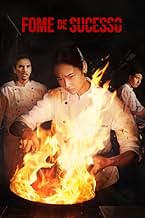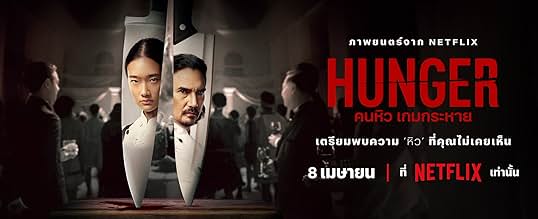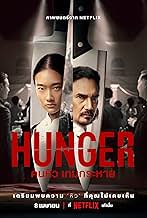A woman running her family's noodle restaurant receives an invitation to join the fine-dining industry under the tutelage of an infamous chef.A woman running her family's noodle restaurant receives an invitation to join the fine-dining industry under the tutelage of an infamous chef.A woman running her family's noodle restaurant receives an invitation to join the fine-dining industry under the tutelage of an infamous chef.
- Director
- Writer
- Stars
- Awards
- 1 win total
- Director
- Writer
- All cast & crew
- Production, box office & more at IMDbPro
Featured reviews
Hunger is a compelling and thought-provoking film that explores the world of cooking and the class divide that exists in society. The movie follows the story of Auy, a young cook who manages her father's old noodle house. Auy is given the opportunity to work with Chef Paul, the owner of a very popular catering business that caters to the elite.
The film's portrayal of the culinary world is captivating, and the cinematography is excellent. The photography of the cooking process is especially impressive, and it truly brings the audience into the kitchen. The film does an excellent job of showing the stark difference between the food that the poor and the rich eat.
As the story progresses, Auy realizes that she cannot condone Chef Paul's policies and unlawful acts. She decides to quit and forms her own cooking team with the help of an entrepreneur. Her restaurant, Flame, quickly becomes a phenomenon in social media, and she is able to compete with Chef Paul when they are both invited to cook for a socialite personality.
However, the film's ending falls short of expectations. It feels somewhat rushed, and the resolution is not as satisfying as it could have been. The film could have benefited from a different ending that tied up loose ends and provided a more satisfying conclusion.
Overall, Hunger is a movie worth watching for foodies and those interested in exploring social issues through the culinary world. Despite the lackluster ending, the film's excellent cinematography and compelling story make it a must-see.
The film's portrayal of the culinary world is captivating, and the cinematography is excellent. The photography of the cooking process is especially impressive, and it truly brings the audience into the kitchen. The film does an excellent job of showing the stark difference between the food that the poor and the rich eat.
As the story progresses, Auy realizes that she cannot condone Chef Paul's policies and unlawful acts. She decides to quit and forms her own cooking team with the help of an entrepreneur. Her restaurant, Flame, quickly becomes a phenomenon in social media, and she is able to compete with Chef Paul when they are both invited to cook for a socialite personality.
However, the film's ending falls short of expectations. It feels somewhat rushed, and the resolution is not as satisfying as it could have been. The film could have benefited from a different ending that tied up loose ends and provided a more satisfying conclusion.
Overall, Hunger is a movie worth watching for foodies and those interested in exploring social issues through the culinary world. Despite the lackluster ending, the film's excellent cinematography and compelling story make it a must-see.
The Thai food movie that's a mix of "The Menu" and "Whiplash" is somewhat similar in some ways, but it's not entirely a copy because it has its own storyline. The story is about a middle-class girl who dreams of elevating herself in high society by showcasing her cooking skills. However, her successful recipe doesn't make her as famous as she expected, and the villainous chef is straightforwardly evil. The characters lack depth in the latter part of the movie, turning it into a typical good vs. Evil scenario, leading to a happy ending that's too easy and predictable. Darker viewers may be slightly disappointed, but overall, the movie is enjoyable, with the lead actor charmingly portraying the role, making the viewers engaged in every scene. There are many beautifully shot cooking scenes, and the production value is high. It is the first Thai movie on Netflix that feels like it has reached a high international standard.
I remember Chutimon Chuengcharoensukying from 2017's Bad Genius and here too, she's phenomenal. While the easy (and obvious) way to look at Hunger is Whiplash meets The Menu, the writing and direction are both pretty solid. They have an interesting tale to tell here; one that doesn't just stick to the hierarchy in a fine-dining restaurant's kitchen. Of course, those bits are as hard-hitting as they come, but the socio-economic layers that the writing offers, sweeten the pot. The protagonist's character arc is clear-cut, and the transitions that she goes through - physically, emotionally, and financially - are always at the film's forefront.
Not only is the film super engaging, it makes you root for the protagonist's eventual realizations. How far are you willing to go to stay relevant and successful in the modern era? And how much success and relevance is too much? Very pertinent questions like these are answered through fiery exchanges between the leads, against the backdrop of deliciously cooked food (and some grotesque consumption). The film also doesn't shy away from doing its bit on "eating the rich" and speaking in detail of their high-profile perversions. From a thematic perspective, Hunger has as much in common with the Malayalam film Ustad Hotel as the films I mentioned above. Nothing comes above family, I guess?
The scene at the hospital between Nopachai Chaiyanam and Chutimon Chuengcharoensukying is spectacular. Not only does it open eyes to the antagonist's understanding of life, but it also throws darts at the protagonist for the choices she's about to make. Same goes for the climactic showdown between the two, but this section treats celebrity connoisseurs as objects of feeding, hence the lessened impact. If Netflix is doing something right, it's in giving Thai cinema the funding it needs to make competent drama-thrillers like this with great production values and cinematography.
Not only is the film super engaging, it makes you root for the protagonist's eventual realizations. How far are you willing to go to stay relevant and successful in the modern era? And how much success and relevance is too much? Very pertinent questions like these are answered through fiery exchanges between the leads, against the backdrop of deliciously cooked food (and some grotesque consumption). The film also doesn't shy away from doing its bit on "eating the rich" and speaking in detail of their high-profile perversions. From a thematic perspective, Hunger has as much in common with the Malayalam film Ustad Hotel as the films I mentioned above. Nothing comes above family, I guess?
The scene at the hospital between Nopachai Chaiyanam and Chutimon Chuengcharoensukying is spectacular. Not only does it open eyes to the antagonist's understanding of life, but it also throws darts at the protagonist for the choices she's about to make. Same goes for the climactic showdown between the two, but this section treats celebrity connoisseurs as objects of feeding, hence the lessened impact. If Netflix is doing something right, it's in giving Thai cinema the funding it needs to make competent drama-thrillers like this with great production values and cinematography.
This film is a commentary on socioeconomic class-divide through food, but not your typical "wow, that's fancy looking food" kinda movie from the food-drama sub-genre.
Plot Aoy (Remember the actor from Bad Genius?), who runs a family noodle shop, wants to be 'special', wants more from life. But how far is she willing to go to become a famous chef? Can she handle everything that will come the fame?
Take Social commentary can sometimes feel too preachy, either the rich or poor side can be made to seem very villainous, but I thought it was fairly balanced here. While there is nothing mind-blowing here, the satire and drama were balanced. Good acting by everybody and also well shot. It's a slow-burn of sorts but the film has a message, that....is thought-provoking, to say the least.
Plot Aoy (Remember the actor from Bad Genius?), who runs a family noodle shop, wants to be 'special', wants more from life. But how far is she willing to go to become a famous chef? Can she handle everything that will come the fame?
Take Social commentary can sometimes feel too preachy, either the rich or poor side can be made to seem very villainous, but I thought it was fairly balanced here. While there is nothing mind-blowing here, the satire and drama were balanced. Good acting by everybody and also well shot. It's a slow-burn of sorts but the film has a message, that....is thought-provoking, to say the least.
This is a film of two halves - unfortunately, these two halves belong in different movies.
The first half has the tone and feel of scabrous satire, clearly wanting to deliver social commentary. Here we are skirting really, really close to the same territory explored by The Menu. The second half discards this and, instead, mimics the dynamic and arc of Wall Street - only with restauranteurs. Which is a shame: the first half was visually arresting and had the potential to be both provocative and interesting. The second half less so.
This is another one of those movies which cause me to scratch my head: what did this want to be? What does the film maker imagine this film to be about?
If you're interested in writing, film-making or whatnot, there is such a thing as the elevator pitch. You're in a lift with some hotshot producer. You've got until those elevator doors ping to pitch your movie. This film, alas, fails that simple test.
The first half has the tone and feel of scabrous satire, clearly wanting to deliver social commentary. Here we are skirting really, really close to the same territory explored by The Menu. The second half discards this and, instead, mimics the dynamic and arc of Wall Street - only with restauranteurs. Which is a shame: the first half was visually arresting and had the potential to be both provocative and interesting. The second half less so.
This is another one of those movies which cause me to scratch my head: what did this want to be? What does the film maker imagine this film to be about?
If you're interested in writing, film-making or whatnot, there is such a thing as the elevator pitch. You're in a lift with some hotshot producer. You've got until those elevator doors ping to pitch your movie. This film, alas, fails that simple test.
Did you know
- TriviaThe house in the opening scene is the same as that of the movie Parasite
- How long is Hunger?Powered by Alexa
Details
- Runtime2 hours 26 minutes
- Color
- Sound mix
- Aspect ratio
- 2.35 : 1
Contribute to this page
Suggest an edit or add missing content




















